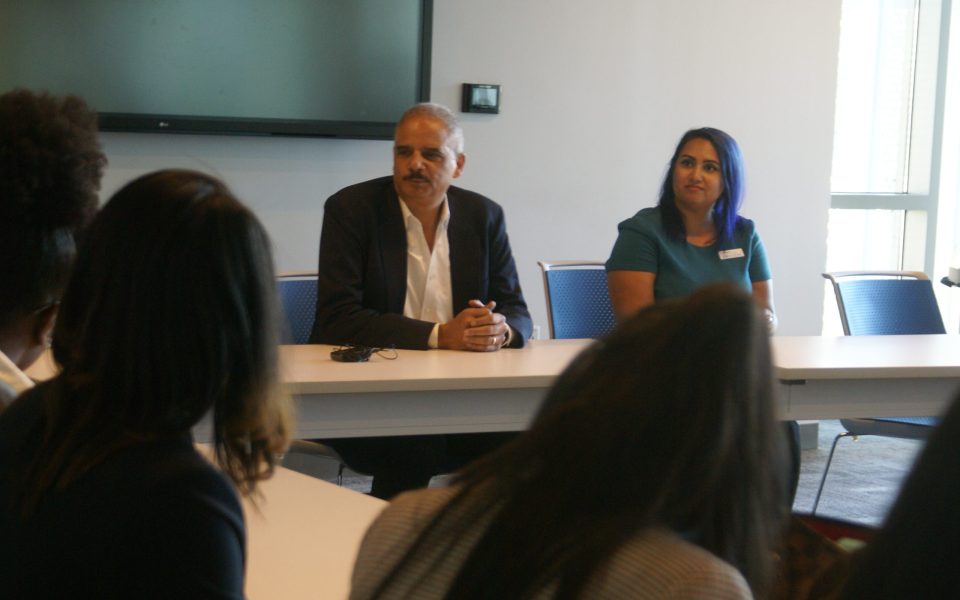A line runs down the middle of the campus at NC A&T University.
Though invisible, the border affects the political experiences of those residing on the campus, dividing it between the 6th Congressional District and 13th Congressional District.
Former
US Attorney General Eric Holder met with students on Thursday to discuss the
implications of North Carolina’s lopsided arrangement for determining political
representation.
Holder, who served under President Obama, visited A&T to bring awareness to the partisan gerrymandering that engineered this split down the middle of campus, and to the nationwide redistricting process set to take place in 2021. The discussion provided a platform for the predominantly black student body to talk about their concerns and experiences.
Representatives from All On The Line, a group with whom Holder works closely, also attended. Part of the National Redistricting Action Fund, the campaign works to undo gerrymandering and focuses on states like North Carolina, which is widely considered one of the most heavily gerrymandered in the nation.
“What’s
going on in North Carolina,” Holder said to students, “is totally inconsistent
with what we say how our system of government should work.”
The
blatant district line down the middle of A&T’s campus represents a larger
issue present the state and country. This line also splits Greensboro, a city
that is largely Democratic-leaning, between two Republican-leaning
congressional districts. The line is emblematic of how Republican-controlled
legislatures in states like North Carolina and Wisconsin have engineered
district lines to lock in a political advantage. North Carolina’s 6th
Congressional District is represented by Rep. Mark Walker while the 13th
Congressional District 13 is represented by Rep. Ted Budd.
“You
can come here and see one campus, one community of interest, and yet they are
split up into separate parts,” Holder said after the forum. “And it is designed
to make sure that these young, African-American voters don’t have the political
power that they should have.”
Holder
and All On The Line aim to network and advocate with grassroots organizations
across the nation about enacting solutions, such as ensuring an accurate census
count, and generating higher voter turnout. Holder and All On the Line are
preparing for the 2020 Census, which will in turn influence how a new map is
drafted in 2021 redistricting. For example, the question of citizenship on the
census would exclude immigrants from the Census count, resulting in less
representation in the areas they reside.
“If you care about a woman’s right to choose, if you care about sane gun-safety laws, if you care about climate, if you care about protecting employee rights, if you care about criminal-justice reform,” Holder said, “all of these issues are tied to who serves in our state legislatures and who serves in Congress.”
Holder
argued that even those without a background in political science should
understand how their representatives are chosen.
“I
think it’s important to come to North Carolina A&T because this is a school
that has produced leaders, that has produced activists,” Holder said afterwards.
“I think we need to engage young people in this fight against gerrymandering,
against voter suppression.”
Josh
Brewer, a senior political science major, said he felt gratified that Holder
chose to engage students.
“He
could have talked to faculty, staff, community organizers,” Brewer said. “But
he chose to talk to students, and that’s a good thing for me.”
Brenda
Caldwell, the attorney general for A&T’s Student Government Association, said
Holder’s visit builds on significant work by student activists to register new
voters and build awareness about the way the campus is split between the two
congressional districts.
“It’s
our future that’s on the line,” she said.
Join the First Amendment Society, a membership that goes directly to funding TCB‘s newsroom.
We believe that reporting can save the world.
The TCB First Amendment Society recognizes the vital role of a free, unfettered press with a bundling of local experiences designed to build community, and unique engagements with our newsroom that will help you understand, and shape, local journalism’s critical role in uplifting the people in our cities.
All revenue goes directly into the newsroom as reporters’ salaries and freelance commissions.


Leave a Reply